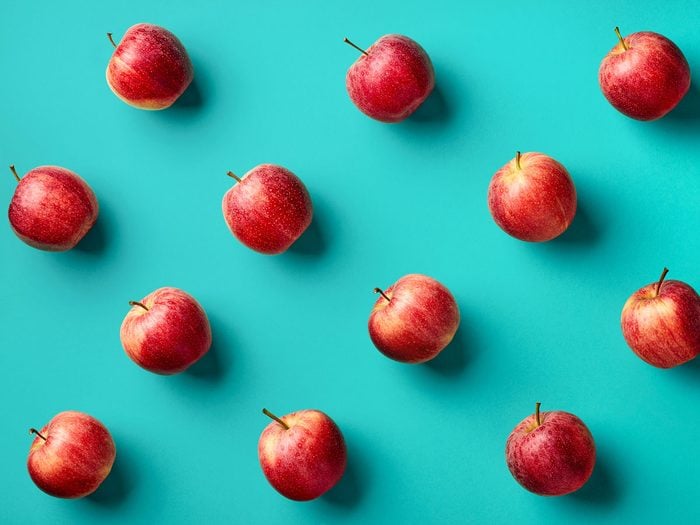
An apple a day keeps the doctor away
While eating an apple a day probably won’t keep you from catching that nasty cold going around the office, a number of studies suggest that it could provide even greater health benefits. Researchers from the University of Oxford estimate that if every adult over 50 ate an apple a day, it could prevent or delay approximately 8,500 vascular deaths from heart attacks and strokes every year in the U.K. Scientists at Cornell also found that eating apples—thanks to their healthy substances like flavonoids and antioxidants—could inhibit the development of breast cancer. Here are some more surprising health benefits of apples.

You can catch up on sleep on the weekend
The negative effects of not getting enough sleep on a regular basis have been well documented—from impaired performance and concentration to increased risk of heart disease, diabetes, and even early death—and for a long time, scientists insisted that you couldn’t “make up” missed sleep. But Swedish researchers are challenging that idea. They found that people who slept for five hours or less each night had a 65 percent higher chance of dying before those who regularly got six or seven hours; however, people who slept five hours a night on weekdays, but longer on weekends, lived just as long as those who slept longer every night.
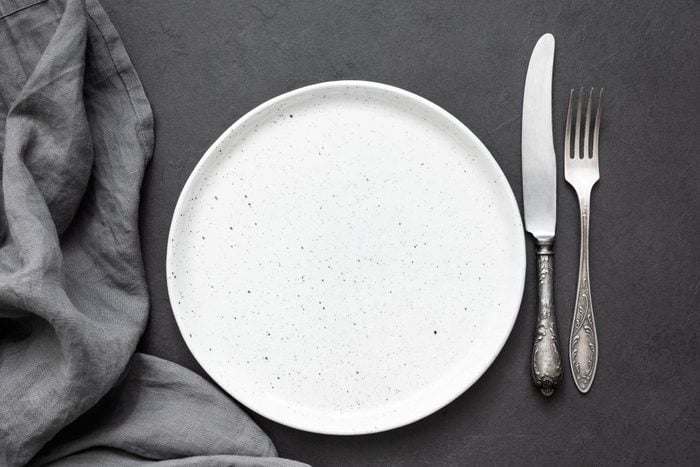
Eating late will make you gain weight
Research tends to support this point, showing that late-night eaters tend to weigh more and have a higher BMI than those who eat earlier in the day, but not because food somehow triples in calories after 10 p.m. One issue seems to lie in the choices people make late at night, according to a number of studies cited by U.S. News & World Report. For example, late-night eaters tend to binge-eat more frequently and consume more calories. Some researchers also theorize that eating at night can disrupt your circadian rhythms and your body’s ability to regulate blood sugar levels, and yet still others have found that daytime eating better regulates the hunger hormones ghrelin and leptin, making you more likely to feel full at the end of the day and less likely to overindulge. Don’t fall for these 15 food myths that will make you gain weight.

Going outside without your jacket will give you a cold
While you need to be exposed to a germ to get sick, you may be more susceptible to that germ when you’re shivering. One study, published in the Proceedings of the National Academy of Sciences, showed that immune cells in your nose and upper airway may not function as well in cooler temperatures. Plus, viruses can become more virulent in the cold, according to the NIH. That’s because cold weather makes the outer membrane of the flu virus solidify, so the germ becomes more durable and easier to transmit. Once it enters your respiratory tract, the gel coating liquefies and the virus is ready to wreak havoc on your body.
Suffering from a cold? Try our Fire Cider Brew recipe.
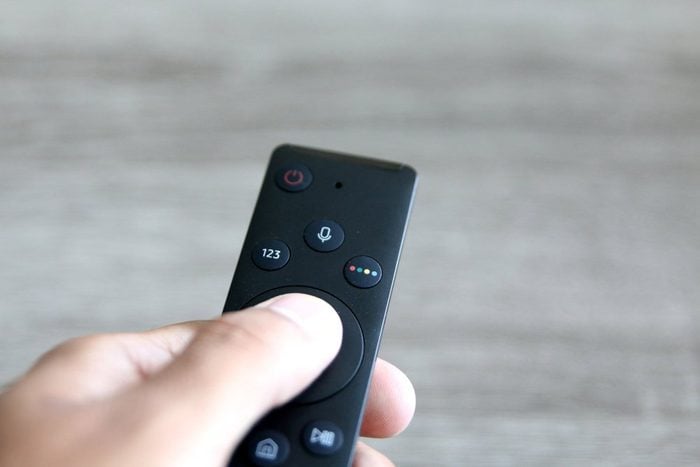
Sitting too close to the TV is bad for your eyes
Actually, this is partially a myth: Despite what mom said, sitting close to the TV seems to be relatively safe, research suggests, with the only potential risks being eye strain and fatigue. But staring at your smartphone—arguably the 21st-century version of this myth—might cause some serious damage. Researchers from the University of Toledo found that the blue light from a smartphone or computer could harm the retina, as well as speed up blindness in patients with macular degeneration. Other scientists worry about children, in particular: One study found that kids who spent seven or more hours per week using computers or playing mobile video games tripled their risk of developing nearsightedness (myopia), while another discovered that children who held their phones eight to 12 inches from their eyes for prolonged periods of time were at a greater risk for temporary convergent strabismus, aka going cross-eyed. Check out the health myths even doctors are guilty of believing.

Spicy foods help you lose weight
While an extra jalapeño or two won’t make the pounds magically melt off, one study suggests that the capsaicin in chili peppers can help with weight loss by encouraging thermogenesis, the production of heat in the body, and that can promote fat-burning. Other researchers have found that spices like cayenne can curb your appetite, help you feel full, and decrease your desire for fatty, sweet, and salty foods, making you less likely to overeat. Don’t miss these health benefits of spicy food.
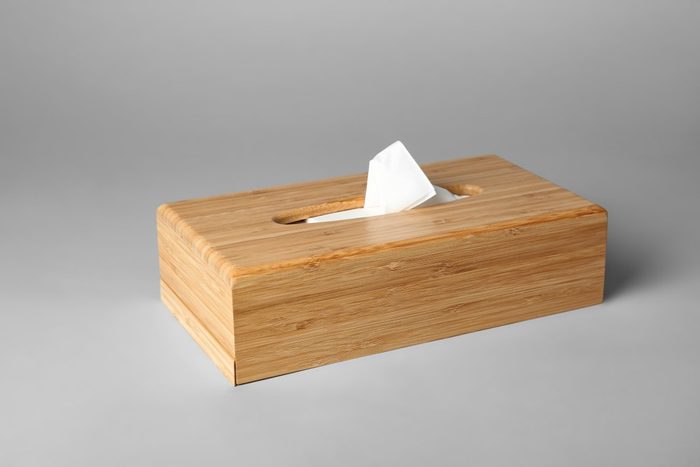
Your allergies will disappear at the first frost
This myth is true, but only if you’re allergic to the types of fall allergens—namely, ragweed. The good news is that cold weather will kill ragweed. The bad news is that allergies can still persist if you’re allergic to something that flourishes during the winter, such as mountain cedar (which pollinates in South and Central Texas from December to March), Christmas trees, mold, or dust mites. Even the cold itself can cause hives and swelling if you have a rare syndrome called cold urticaria. These Canadian cities are the worst for allergies.
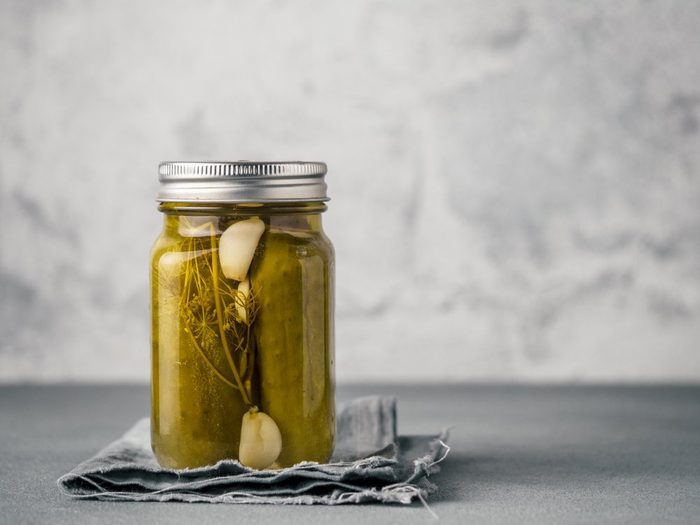
Pickle juice cures cramps
Yes, really. One study published in the journal Medicine & Science in Sports & Exercise found that it relieved cramps in around 1.5 minutes, 45 percent faster than if people hadn’t taken anything. While scientists aren’t sure why this happens, they theorize that the pickle juice causes a muscular reflex when it hits the back of your throat, turning off misfiring neurons throughout the body and therefore the cramp. The vinegar may be responsible for this phenomenon, and other researchers believe that mustard can have the same effect.
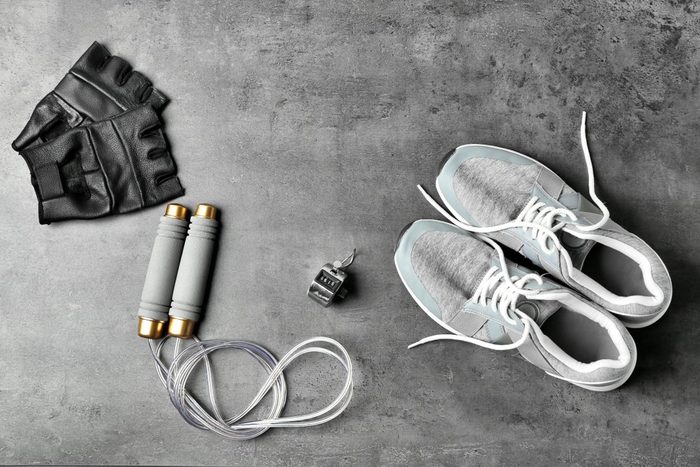
Exercise makes you smarter
It’s not just your body that benefits from exercise; it’s also your brain. This is due to a beneficial molecule called irisin, which the body produces during endurance exercise, according to researchers from the Dana-Farber Cancer Institute and Harvard Medical School. When levels of irisin rise, genes related to learning and memory are activated, and the expression of BDNF (brain-derived neurotrophic factor) increases, creating new neurons. This can also lower levels of the stress hormone cortisol, as well as improve your critical thinking (not to mention your mood and stress levels). Other studies attribute the cognitive boost exercise provides to the increase in brain oxygen levels and the mental workout you get during competitive sports. However, make sure you know the truth about how acupuncture can help improve your fitness.

Heartburn during pregnancy results in a baby with a full head of hair
You’ve got to give it to those old wives—sometimes their tales turn out to be true. In this case, a John Hopkins University study found that women who suffered from moderate to severe heartburn did indeed give birth to babies with luxurious locks. On the flip side, the babies whose mothers didn’t experience heartburn had little or no hair. The connection isn’t completely clear; the researchers theorize that extra-high levels of estrogen and other pregnancy hormones may both encourage fetal hair growth and relax the sphincter at the top of the esophagus, allowing acidic digestive fluids to back up and trigger heartburn symptoms.
Don’t miss these sneaky reasons behind a missed period (other than pregnancy!).
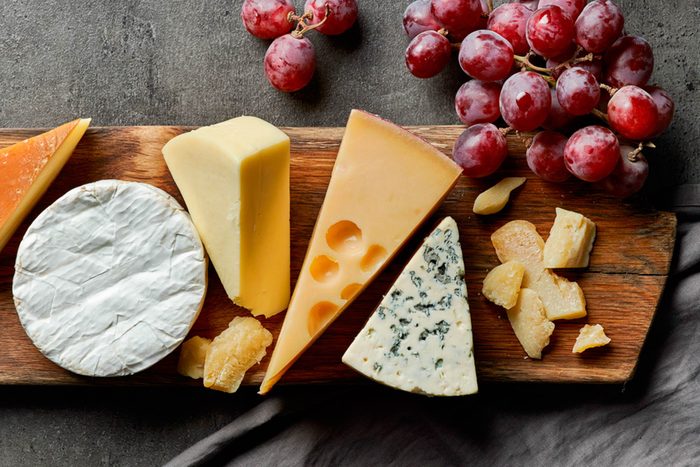
Eating cheese before bedtime gives you strange dreams
That was the surprising finding of a study from the British Cheese Board, which further revealed that different cheeses gave subjects different types of dreams. For example, 85 percent of the women who ate Stilton had crazy, vivid dreams, while 60 percent of participants who snacked on Red Leicester dreamed about their childhoods. This may have something to do with the tryptophan in milk, which encourages sleep and reduces stress levels. None of the test subjects reported having nightmares after their fromage fest, though Men’s Health theorizes that this other cheese-related myth may be due to the food-distress hypothesis: People with some degree of lactose intolerance may suffer from sleep disruption and, as a result, bad dreams. Here are 13 other strange things that could be wrecking your sleep.

When it comes to your brain, use it or lose it
A bevy of research indicates that if you constantly challenge your brain, you may be able to stave off cognitive impairment, dementia, and possibly even Alzheimer’s disease. One study, which focused on people between 55 and 75, suggests that something as simple as playing video games could improve brain function and increase grey matter in the hippocampus. Another looked at older adults who regularly engaged in “mentally engaging activities,” such as reading and doing crossword puzzles, and reported that they scored higher on mental-sharpness tests.
Also surprising? These 25 everyday things you can get addicted to.
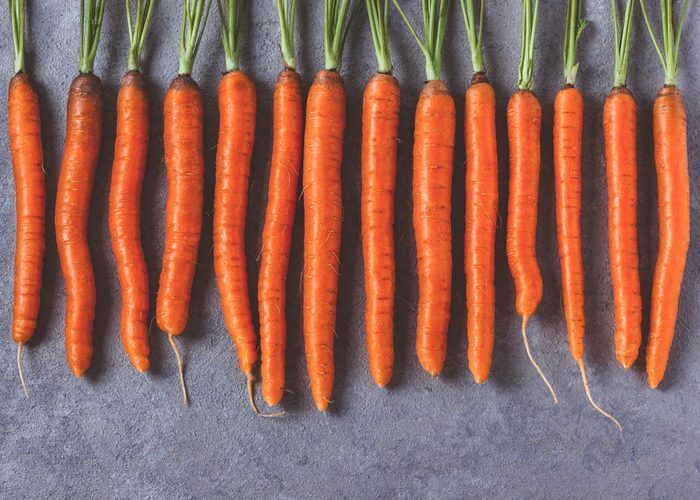
Carrots are good for your eyes
While carrots won’t improve your vision, research suggests that they can help maintain it. The reason lies with beta carotene, a carotenoid (or pigment) that the body converts to vitamin A. Your body uses vitamin A to build proteins for eye cells; if you have too little of it, you might even suffer from night blindness. Furthermore, a study published in JAMA Ophthalmology found that people who ate high levels of carotenoids had a 40 percent lower risk of developing advanced macular degeneration, the most common cause of age-related blindness. And for the record, it’s not just carrots: Sweet potatoes and orange peppers, as well as dark, leafy greens like spinach and kale are also rich in carotenoids. Now that you know which health myths are actually true, make sure you read up on these 50 fitness myths that can seriously damage your health.
